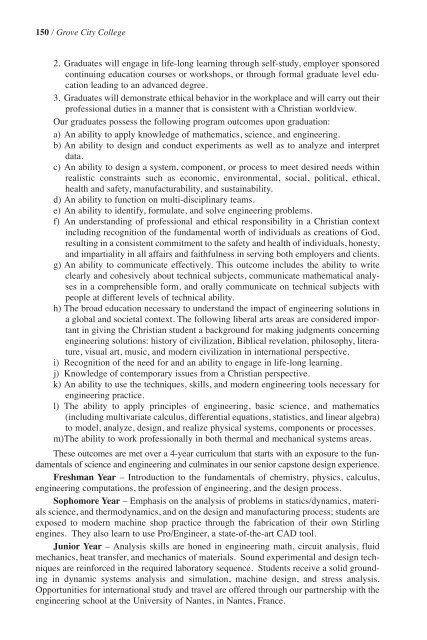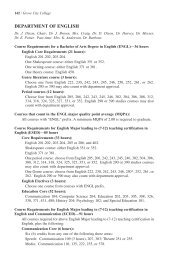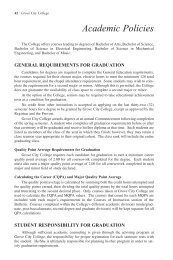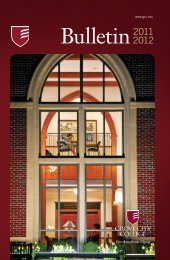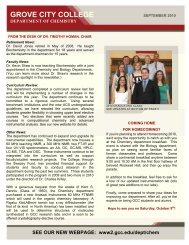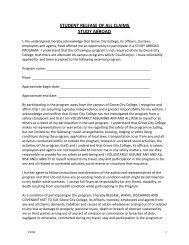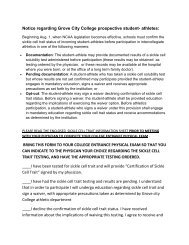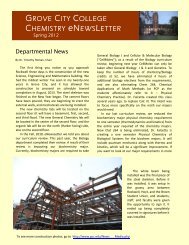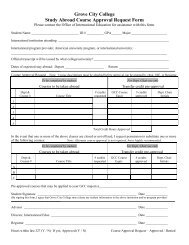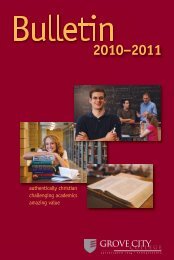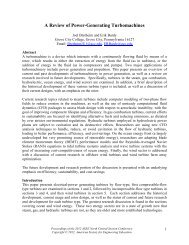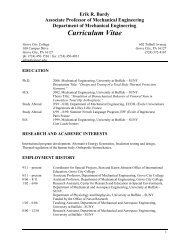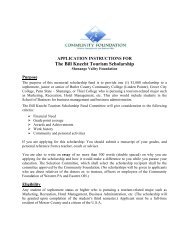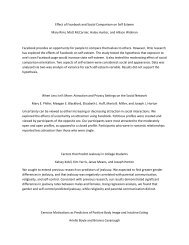2009–2010 - Grove City College
2009–2010 - Grove City College
2009–2010 - Grove City College
Create successful ePaper yourself
Turn your PDF publications into a flip-book with our unique Google optimized e-Paper software.
150 / <strong>Grove</strong> <strong>City</strong> <strong>College</strong><br />
2. Graduates will engage in life-long learning through self-study, employer sponsored<br />
continuing education courses or workshops, or through formal graduate level education<br />
leading to an advanced degree.<br />
3. Graduates will demonstrate ethical behavior in the workplace and will carry out their<br />
professional duties in a manner that is consistent with a Christian worldview.<br />
Our graduates possess the following program outcomes upon graduation:<br />
a) An ability to apply knowledge of mathematics, science, and engineering.<br />
b) An ability to design and conduct experiments as well as to analyze and interpret<br />
data.<br />
c) An ability to design a system, component, or process to meet desired needs within<br />
realistic constraints such as economic, environmental, social, political, ethical,<br />
health and safety, manufacturability, and sustainability.<br />
d) An ability to function on multi-disciplinary teams.<br />
e) An ability to identify, formulate, and solve engineering problems.<br />
f) An understanding of professional and ethical responsibility in a Christian context<br />
including recognition of the fundamental worth of individuals as creations of God,<br />
resulting in a consistent commitment to the safety and health of individuals, honesty,<br />
and impartiality in all affairs and faithfulness in serving both employers and clients.<br />
g) An ability to communicate effectively. This outcome includes the ability to write<br />
clearly and cohesively about technical subjects, communicate mathematical analyses<br />
in a comprehensible form, and orally communicate on technical subjects with<br />
people at different levels of technical ability.<br />
h) The broad education necessary to understand the impact of engineering solutions in<br />
a global and societal context. The following liberal arts areas are considered important<br />
in giving the Christian student a background for making judgments concerning<br />
engineering solutions: history of civilization, Biblical revelation, philosophy, literature,<br />
visual art, music, and modern civilization in international perspective.<br />
i) Recognition of the need for and an ability to engage in life-long learning.<br />
j) Knowledge of contemporary issues from a Christian perspective.<br />
k) An ability to use the techniques, skills, and modern engineering tools necessary for<br />
engineering practice.<br />
l) The ability to apply principles of engineering, basic science, and mathematics<br />
(including multivariate calculus, differential equations, statistics, and linear algebra)<br />
to model, analyze, design, and realize physical systems, components or processes.<br />
m)The ability to work professionally in both thermal and mechanical systems areas.<br />
These outcomes are met over a 4-year curriculum that starts with an exposure to the fundamentals<br />
of science and engineering and culminates in our senior capstone design experience.<br />
Freshman Year – Introduction to the fundamentals of chemistry, physics, calculus,<br />
engineering computations, the profession of engineering, and the design process.<br />
Sophomore Year – Emphasis on the analysis of problems in statics/dynamics, materials<br />
science, and thermodynamics, and on the design and manufacturing process; students are<br />
exposed to modern machine shop practice through the fabrication of their own Stirling<br />
engines. They also learn to use Pro/Engineer, a state-of-the-art CAD tool.<br />
Junior Year – Analysis skills are honed in engineering math, circuit analysis, fluid<br />
mechanics, heat transfer, and mechanics of materials. Sound experimental and design techniques<br />
are reinforced in the required laboratory sequence. Students receive a solid grounding<br />
in dynamic systems analysis and simulation, machine design, and stress analysis.<br />
Opportunities for international study and travel are offered through our partnership with the<br />
engineering school at the University of Nantes, in Nantes, France.


